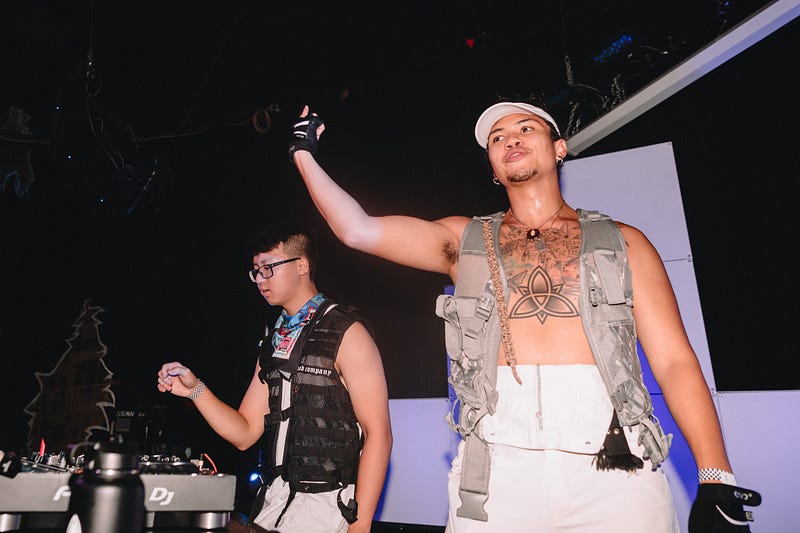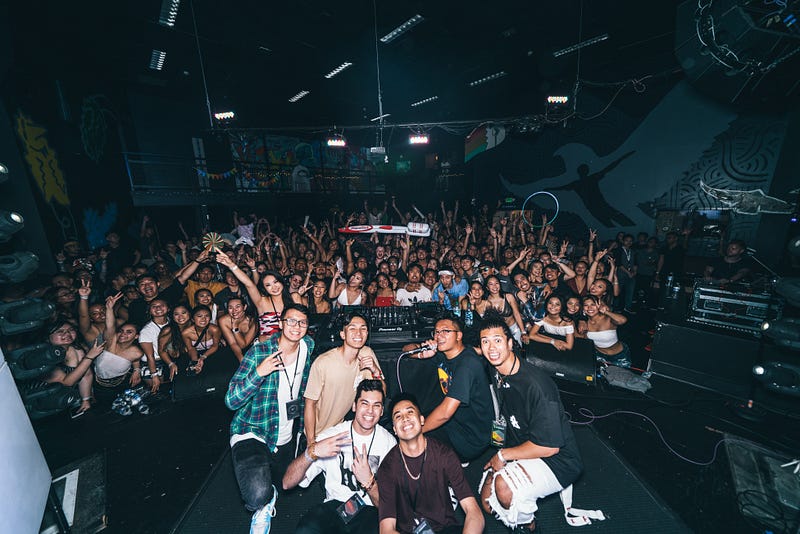Turning the Turntables
Local DJs fight to raise awareness and bring representation to the music scene
By Naomi Schapiro

Trill: A word defined by 80s Southern hip-hop rapper Bun B as a person who is respected, a combination of “true” and “real.”
Trillium: A flower that blooms in early spring.
Trillivm: A DJ and producer who graduated from Western Washington University, and is now living in Seattle. He identifies as Filipino, Black, and Puerto Rican, and wants to bring more representation to artists of color.
William Zayas, who goes by the stage name Trillivm, sat outside of the Performing Art Center on a winter night in 2016, mixing music on his turntable and looking out at the sunset. Having played only at open mic nights at the Underground Coffee House, he dreamt that by the time he graduated from Western in two years, he would have played at the Wild Buffalo House of Music.
A photographer approached, and asked if he could take a picture. Trillivm said yes, and the picture was posted on Western’s Instagram.
[embed]https://www.instagram.com/p/BMm2TnCjo_M/[/embed]
After the picture was posted in November 2016, Trillivm received a Facebook message from a man, asking if he wanted to play a gig. Trillivm said sure, and asked where he would be playing. It turned out the man worked for the Wild Buffalo.
Fast forward two years, Trillivm is an anthropology student at Western. He is now playing at house parties along with other gigs. He meets two other Asian American DJs at different parties: Ricky Rath, a Western student who goes by the stage name R-squared, and Phillip Nguyen, Whatcom Community College student whose stage name is Winslo.
Rath, who identifies as Cambodian-American, wanted to find a way to get more Asian DJs in the limelight.
“You don’t see a lot of Asian representation or artists of color in electronic music,” Rath said. “I wanted to create a platform for all those underrepresented artists who we don’t see much of on the stages.”
Winslo, who identifies as Vietnamese, agreed that it was hard to find people to look up to as a DJ of color. He said you just have to find a way to push past that.
One of the groups Winslo said he looks up to is 88 Rising. It’s a hybrid management, record label, video production and marketing company that serves as a platform for primarily Asian and Asian American artists, according to founder Sean Miyashiro. They also put on musical festivals featuring predominantly Asian artists.
As founder of LGCY Media (formerly known as R-squared media), Rath looks to this group for inspiration as well. He said he hadn’t seen anything like them before.
LGCY Media is an organization dedicated to carving legacies for others through digital media, content creation, and music.
Rath heard Odesza was coming to Bellingham to perform a benefit show to raise money for scholarships in summer 2019.
“I thought, man, what if I did something like that, but for a specific scholarship cause,” Rath said.
He spent the rest of that day walking through campus, thinking about how he could make it happen. He created a board of directors, a group of friends to help fulfill his vision, and asked Trillivm and Winslo to perform.
They planned to donate the money they raised to Southeast Asian students in Washington who wanted to pursue a degree in arts or the media.
They decided to have the show at the Vera Project in Seattle on Aug. 16. The Vera Project is an all-ages venue, with a mission “to foster a participatory creative culture through popular music concerts, arts programs, experiential learning and volunteer opportunities for all ages, especially young people,” according to their website.
After much planning and marketing, they ended up selling out the show, filling the 280 seats. They paid for marketing, staff and lights and raised $4,000 to donate to the scholarship recipients.

The scholarship application was open for about a month, August to September. Applicants were required to be Southeast Asian American, attending a two or four year college in Washington, and planning to pursue a creative arts or media major.
Rath said he is a firm believer in not letting a GPA define you, so he made sure not to include it as a requirement. Applicants also had to write an essay, and could include a portfolio of their work. A committee within the board decided on two students who go to the University of Washington to receive $2,000 each.
“I felt a lot of struggle being in a media-based major, especially financially with higher education,” said Rath, who graduated last year with a degree in public relations. “A lot of our families came here from war-torn countries and some of us are the first to go to college. So in the end, this scholarship was worth it.”
The three DJs also played a show with another artist named Dingo at the Wild Buffalo called UNDERREPRESENTED last year. Rath said he planned it through his internship with the Wild Buffalo, to create a platform for local DJs of color. They plan on taking UNDERREPRESENTED to Seattle as a small show in the next few months.
Rath said Trillivm helped open the door for him to start playing more professional gigs.
“I love the way he performs,” Rath said. “It is rare to see someone like Trill who has the energy to get down and dance with the crowd.”
Trillivm credits his love of performing to dance. During a family trip to Japan when he was six years old, he went to an arcade and fell in love with Dance Dance Revolution. With time, he got to the expert level, and would draw in crowds of nearly 100 people watching him play at the mall.
In 2014, he moved on to gloving, an art form involving led lights put onto each finger inside of a glove. Trillivm said he loved that he could give individual, one-on-one shows. He ended up competing at the Seattle gloving competition, and going to other tournaments with a team called Unique Visuals.
“After I started gloving was when I considered myself an artist,” Trillivm said. “I thought being an artist meant you could draw or paint, I didn’t realize it meant that you could perform too.”

Trillivm started attending shows, and after a few years he became interested in DJing. He didn’t think he could do it because he didn’t see people like him performing, and thought that you would need a lot more experience to start.
But Trillivm said the real starting point for him was when he went to see Autograf, a dance/electronic group. One of the artists performing looked like he could be Filipino, like he could be his older brother.
“I thought that all DJs were white dudes,” Trillivm said. “So that got me hyped.”
Within two months, he had purchased a turntable and all the equipment he needed to DJ, but he was still scared to get started. After playing at a party for fun, Trillivm decided it was time to go all in, right around the time he started at Western in 2015.
He started performing at the Underground Coffeehouse every Tuesday during their open mic nights. Between poets and singers, Trillivm went up on stage and would play hard trap on his turntable. While people loved it, Trillivm said he felt a bit out of place among the calmer acts.
“It was awesome in the moment, but I don’t know if I would ever do that again,” Trillivm said, laughing. “I don’t think I would have that confidence.”
After performing his first gig at the Wild Buffalo, he started playing at house shows around Bellingham. At one of these shows, he met Winslo.
“He introduced me to producing, and that is when my whole life changed,” Trillivm said. “I realized I wanted to produce, and that was the start.”
Trillivm came out with his first album “Decolonizing House Music” in August. He came up with the name after participating in a forum at Western called Decolonizing Anthropology. The forum was held in response to Paul James using the N-word in class. Students of color presented four proposals the Department of Anthropology needed to initiate, according to a Western Front article.
As someone who identifies as a part of different ethnic groups, Trillivm said he often feels like the “other,” no matter which space he is in.
“A lot of the album is an expression of that anger, the hurt from feeling like I am always an other,” Trillivm said. “ The act of making the album is decolonizing house music in my eyes, because the odds were stacked against me to not make music and here I am.”
Each song took about three to five weeks, Trillivm said. He started thinking about making the album last March, already having produced three songs at the time. Altogether, he worked on the album for about six months.
[embed]https://soundcloud.com/trillivmmusic/definition-of-trill[/embed]
“Definition of Trill” is the song he imagines being played most in big rooms all over the country. He said when people ask him what Trill means, it’s the song he shows them.
“All of the lyrics are from a YouTube interview of Bun B explaining what the word trill means,” he said. “This way, you can hear it from the man who started the whole movement.”
Trillivm wants to make sure that other young artists have the drive to produce music, even if all the odds are against them.
“Wherever you direct your energy, if you put your all into it, you will receive it back,” he said. “You will hear hundreds of thousands of noes, but please keep going if you really love what you do.”
